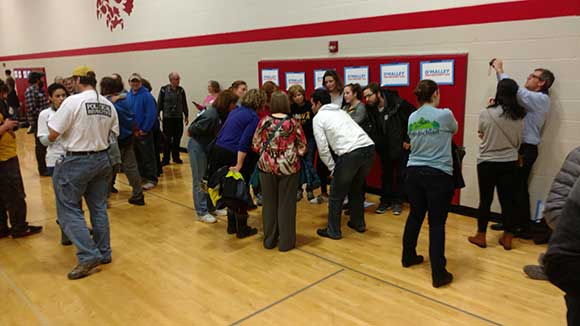Why are Iowa and New Hampshire so important?

At a Democratic caucus in Iowa this week, Martin O'Malley supporters discuss whether to throw their support for Clinton or Sanders. Photo by John Aldrich.
New Hampshire has held the first primary in the nation since the 1950s. It is a small state and for a long time, no other state cared much about presidential primaries, so New Hampshire happily gathered the small bump in media attention that being the first in the nation of a not terribly important process entitled them to.
When primaries became important, the value of being first went up considerably, and it went up considerably more once candidates discovered how important getting early momentum would be. New Hampshire moved aggressively to maintain its now-valuable first-in-the-nation status. Indeed, it passed a law setting its date to be at least a week before the otherwise earliest primary, so that it would always do everything it could to be first.
Both major parties have reflected on this tradition and endorsed it, at the very least because if a really large state went first, the likely effect on momentum would be huge (to use a Trump-ism). Indeed, the parties have adopted (and enforced) rules that penalize states for going too soon in the process. Both Michigan and Florida Democrats had their number of delegates to the 2008 national convention halved because of their flaunting of the national party’s attempt to keep a small state first.
Iowa and its caucus goes first, even before New Hampshire’s primary. In 1972, for no obvious reason, Iowa decided to hold its caucus early, perhaps to compete with New Hampshire for that tiny attention that comes with being first. No one covered the first caucuses in 1972, nor did anyone cover the second one in 1976 except for one journalist. The New York Times reporter R.W. “Johnny” Apple was fascinated by the campaign of Jimmy Carter; his was a truly long-shot nomination bid. His earliest ads used the tag-line “Jimmy Who?” reflecting how hardly anyone even recognized the name of this one-term (and that a two-year term at that) Georgia governor. And yet there was Carter and his often one-person entourage (Jody Powell, soon to be his White House Press Secretary) carrying their own luggage, driving rental cars through the snow to small towns across Iowa and New Hampshire.
Curious, Apple spent some time following Carter in Iowa. Surprisingly, Carter connected well with Iowa Democrats. At a small fair and campaign event in 1975, Carter was able to attract more support from Iowans than anyone else. That was largely because he saw no way to the nomination except outworking everyone else, and not many appreciated the potential effect of a surprise showing in Iowa on the presidential nomination.
Apple did not forecast a victory by Carter, but he did say that Carter was worth watching, and that put Apple into a far more prescient forecasting position than anyone else. When Carter did win, he did get Ol’ Mo on his side and went on to a truly major upset nomination victory (upsetting no one in particular because the only really strong candidate, Sen. Ted Kennedy, choose not run at all). And Apple did draw attention among his peers and went on to become simply the most important political reporter in the nation.
As a result, the question every four years is: Can lighting strike in Iowa, New Hampshire or both once again, just like it did for Carter?
-- John Aldrich